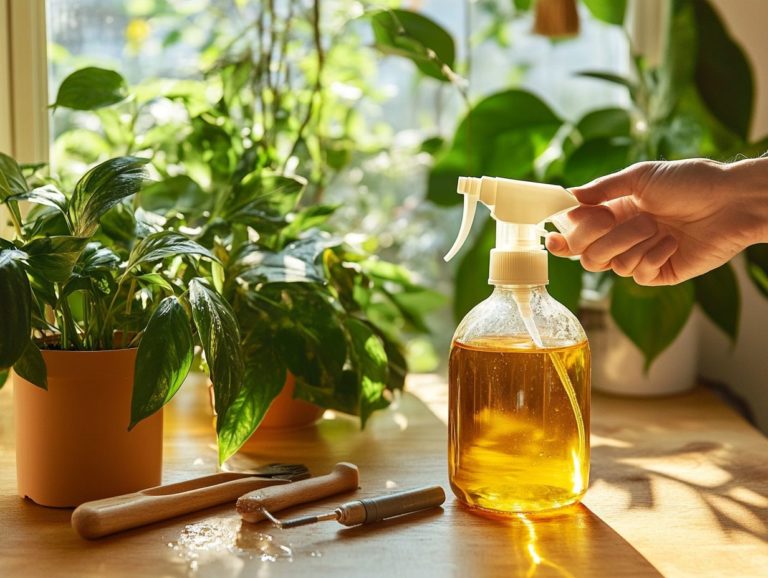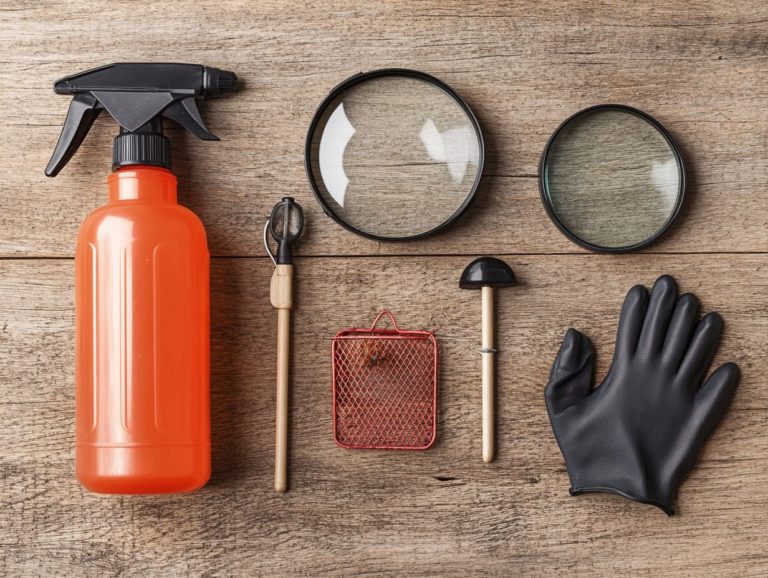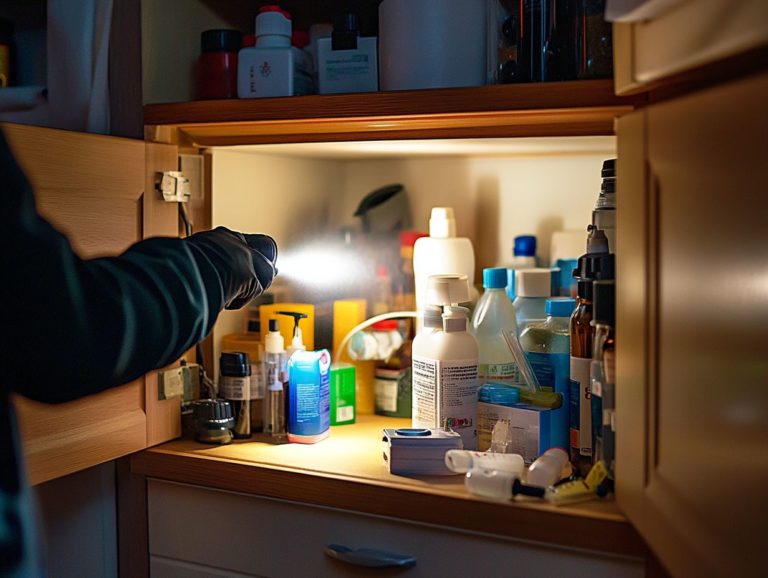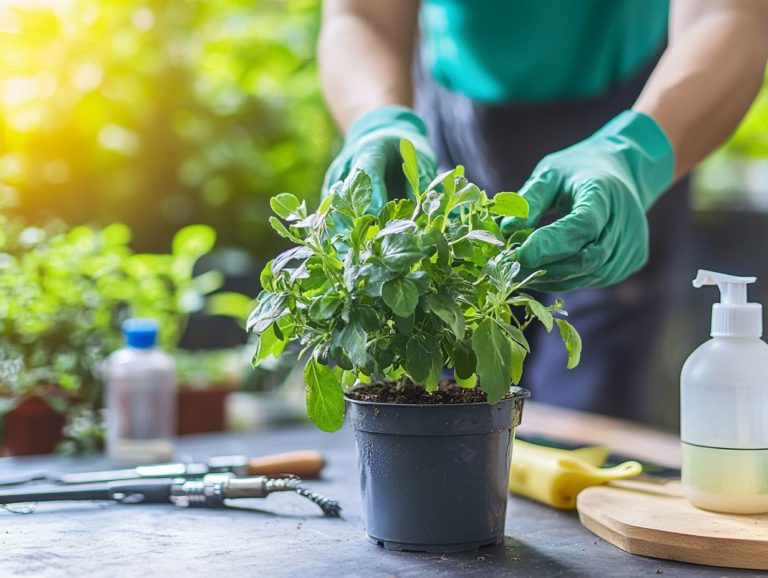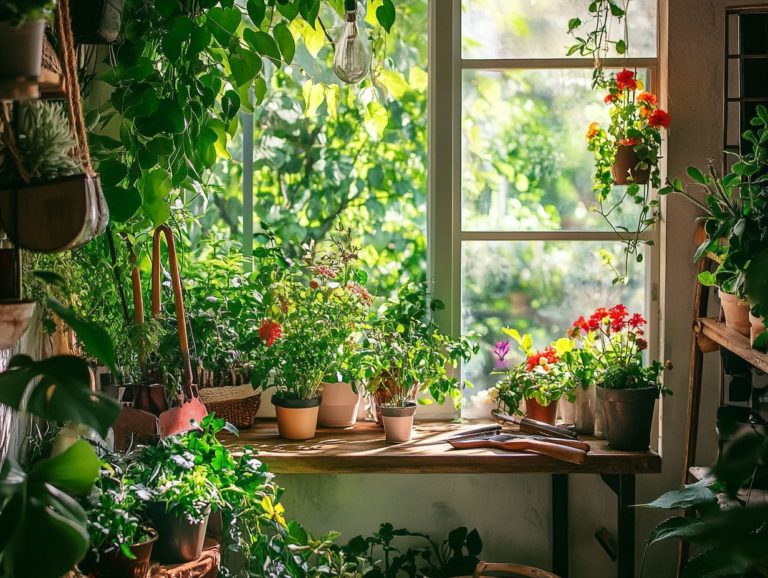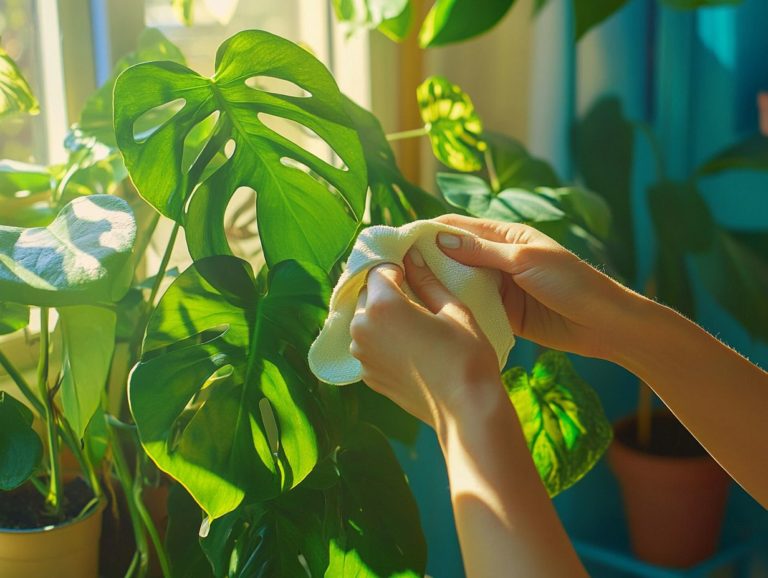Essential Pest Control Techniques for Houseplants
Houseplants bring beauty and vitality into your home, yet they can fall victim to various pests, including common ones like aphids and spider mites that threaten their health.
Pest control is vital for your plants. This essential first step ensures their thriving presence and allows you to effectively manage pests.
This article delves into common houseplant pests, guides you on effective identification and prevention strategies, and presents an array of pest control methods from natural remedies to chemical solutions.
With a little attention, you can turn your indoor garden into a vibrant oasis! By adopting pest management techniques that combine natural and chemical ways to manage pests, you can maintain the health and vibrancy of your plants.
Embark on this journey with us as we uncover the best practices for nurturing your indoor garden and controlling pests effectively!
Contents
- Key Takeaways:
- Common Houseplant Pests
- Natural Pest Control Methods
- Chemical Pest Control Options
- Integrated Pest Management for Houseplants
- Frequently Asked Questions
- What are essential pest control techniques for houseplants?
- What are some natural pest control methods for houseplants?
- How can I prevent pests from infesting my houseplants?
- What are some signs of pest infestation in houseplants?
- Are chemical pesticides safe to use on houseplants?
- What should I do if I notice pests on my houseplants?
Key Takeaways:
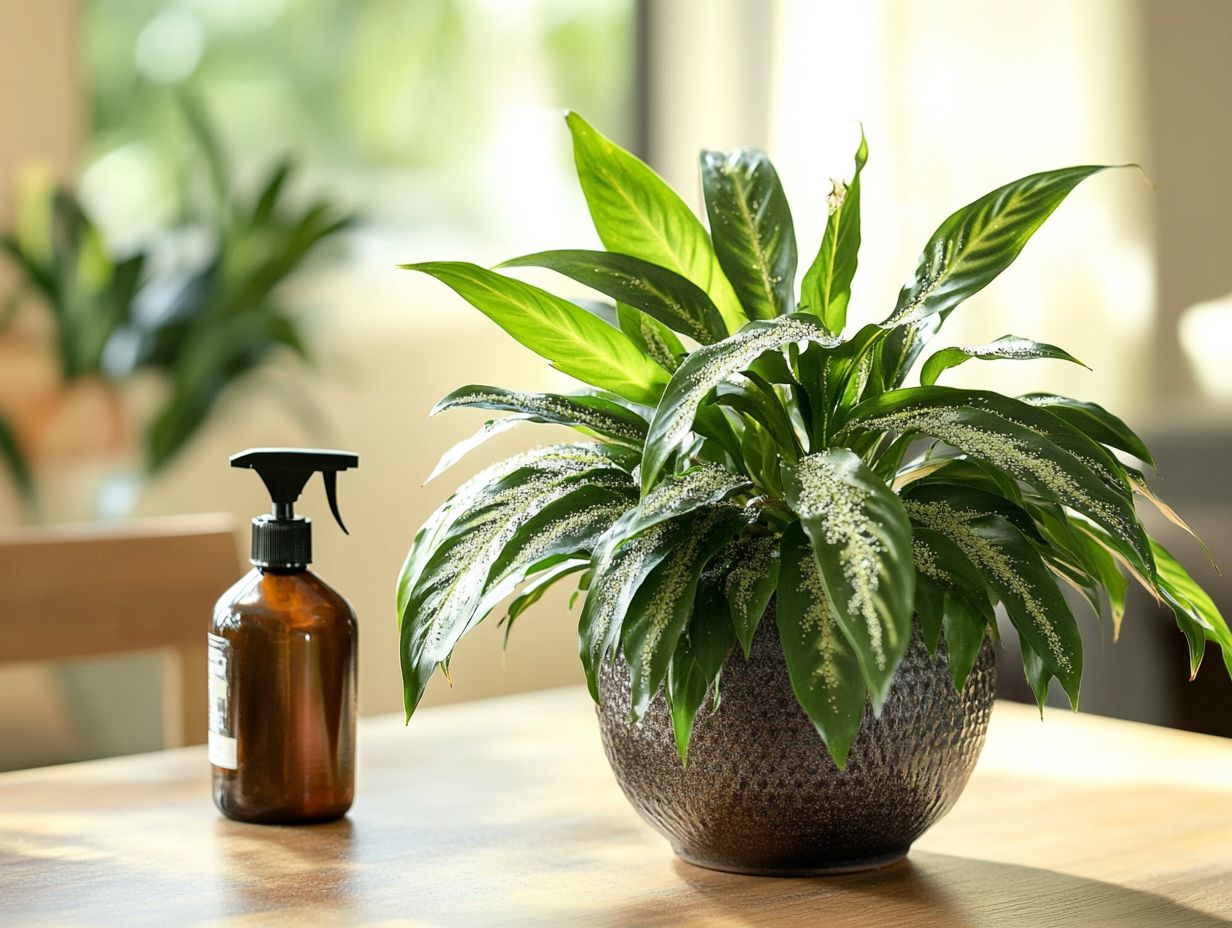
- Keep your plants healthy with regular pest control to prevent infestations of small pests.
- Identify and prevent common pests by regularly inspecting your plants and using natural remedies.
- Consider combining natural and chemical methods for effective and safe pest control, providing you with a comprehensive approach to treatment.
Why is Pest Control Important for Houseplants?
Pest control is essential for keeping your houseplants healthy, as these tiny invaders can quickly turn your indoor garden into a battlefield. Pests like spider mites, mealybugs, and aphids don t just nibble on leaves; they can lead to serious problems if you don t act swiftly, making it crucial to recognize the signs of infestation.
Effective pest management helps your plants thrive by controlling infestations, preventing disease spread, and maintaining optimal environmental conditions. By taking proactive measures, you can protect your houseplants, allowing them to flourish beautifully in your home.
It s crucial to recognize the early signs of a pest problem. For example, if you spot yellowing leaves, webbing, or sticky residue, it s time to investigate further.
Natural treatments like neem oil and insecticidal soap, as well as Baby Bio, are excellent options. They tackle a variety of common pests without damaging your plants. Regular inspections are key to your success, along with maintaining proper watering habits and providing sufficient light to boost your plants’ resistance to pests, ensuring optimal soil moisture levels.
By cultivating this attentive routine, you can transform your indoor garden into a thriving sanctuary, free from unwanted nuisances.
Common Houseplant Pests
Identifying common houseplant pests is crucial for effective pest management and for keeping your indoor plants vibrant and healthy. This requires vigilance against pests like scale insects and fungus gnats. Your houseplants can fall prey to various pests, including spider mites, mealybugs, scale insects, and fungus gnats, each presenting its own set of challenges that require specific control measures.
By recognizing the signs of these pests like discolored leaves or sticky honeydew residue you can catch them early and address them promptly, ensuring that you effectively remove any unwanted bugs. Understanding what to look for gives you the power to take swift action, safeguarding your cherished plants from potential harm.
Start checking your plants today to keep them thriving!
Identification and Prevention
Identifying pests on your houseplants is essential for effective prevention and control. This includes knowing different insect types and the signs they leave behind.
Early detection gives you the power to act swiftly against any infestations. Look out for common signs like webs, sticky leaves, and visible bugs these can indicate unwelcome guests like spider mites or aphids, which can damage your plants.
Taking preventive steps, like regularly checking your plants and quarantining new arrivals, can greatly reduce the chances of pest infestations. A proactive approach ensures a healthy environment for your cherished plants.
To manage pests effectively, understand the signs and the conditions that attract them. High humidity and overwatering can create inviting spots for pests, while proper watering techniques help maintain the right soil moisture.
Add plants that repel pests, like marigolds or basil, to enhance your prevention strategies. Additionally, consider using natural remedies for houseplant pests and practice quarantine for new plants to catch hidden pests early and safeguard your indoor garden.
Natural Pest Control Methods
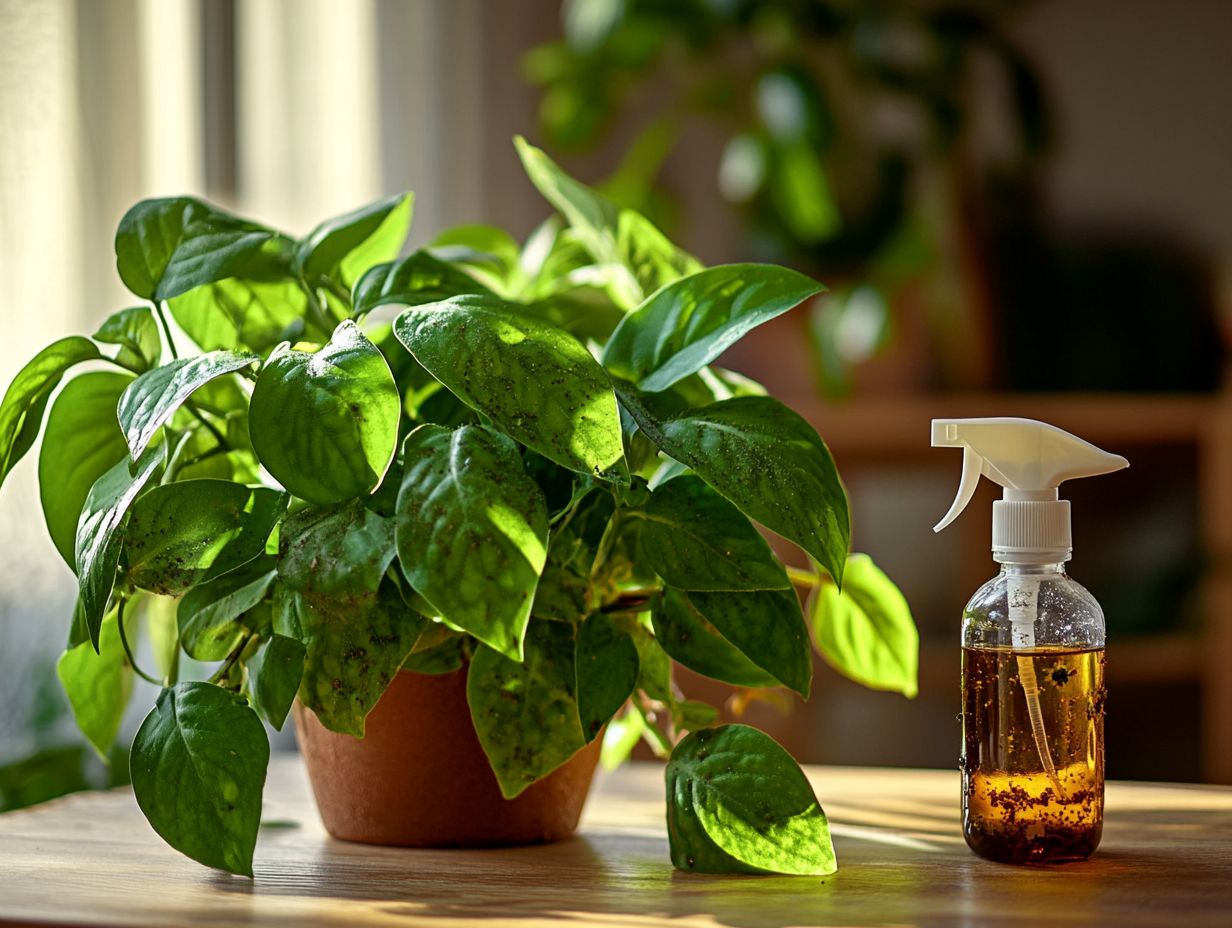
Natural pest control methods offer effective strategies for managing common houseplant pests without harsh chemicals. This approach ensures the health of your plants and the safety of the environment.
Remedies like neem oil and insecticidal soap target pests gently, making them ideal for treatment. These solutions can help you fight infestations of aphids, mealybugs, and other pests.
For the best results, know the proper application techniques and timing for treatments like neem oil and insecticidal soap. Understanding these details is key to effective pest management.
Using Non-Toxic Remedies
Non-toxic remedies for pest control safeguard your plants and enrich your indoor space. Consider neem oil and insecticidal soap these effective tools tackle various pests while protecting beneficial insects.
These remedies are easy to apply and work well with good care practices. Knowing when and how to use these non-toxic solutions is essential for mastering pest management.
Besides neem oil and insecticidal soap, explore other non-toxic alternatives like diatomaceous earth. This clever option efficiently dehydrates pests like cockroaches and ants when dusted around infested areas.
A homemade garlic spray can also deter pests like aphids and spider mites. By blending garlic with water and a few drops of dish soap, you create a powerful, natural repellent.
These remedies reduce reliance on harsh chemicals and support sustainable pest control. Combine them with preventive measures like proper sanitation, sealing entry points, and rotating crops for a holistic pest management strategy.
Chemical Pest Control Options
Chemical pest control options can serve as a last-resort solution for those persistent infestations, such as those caused by certain bugs, that refuse to yield to natural remedies. However, you must apply them with care to safeguard your houseplants and the surrounding environment, ensuring proper usage of products.
Pesticides can effectively tackle various pests. Selecting the right product and meticulously following the manufacturer’s instructions is crucial for ensuring both safety and effectiveness in pest control measures. By understanding the risks and benefits of chemical treatments, you empower yourself to make informed decisions about pest management in your indoor garden.
When and How to Use Pesticides
Understanding when and how to use pesticides is essential for effective pest management in your houseplants. This allows you to protect both your plants and the environment from harmful pests.
The timing for applying pesticides depends on several factors, including the life cycle of the pests, environmental conditions, and the specific pesticide in question, which can vary based on the insect type. For example, spraying in the early morning or late evening can help shield beneficial insects, such as ladybugs, and decrease the risk of evaporation.
It s vital to prioritize safety by wearing gloves and a mask. This ensures that you remain unharmed while handling these products. In indoor settings, maintaining proper ventilation is key to reducing any potential health risks.
Follow the manufacturer’s instructions and use best practices like opting for spot treatments instead of blanket applications to boost the effectiveness of your pesticides now while minimizing their impact on helpful organisms.
Integrated Pest Management for Houseplants
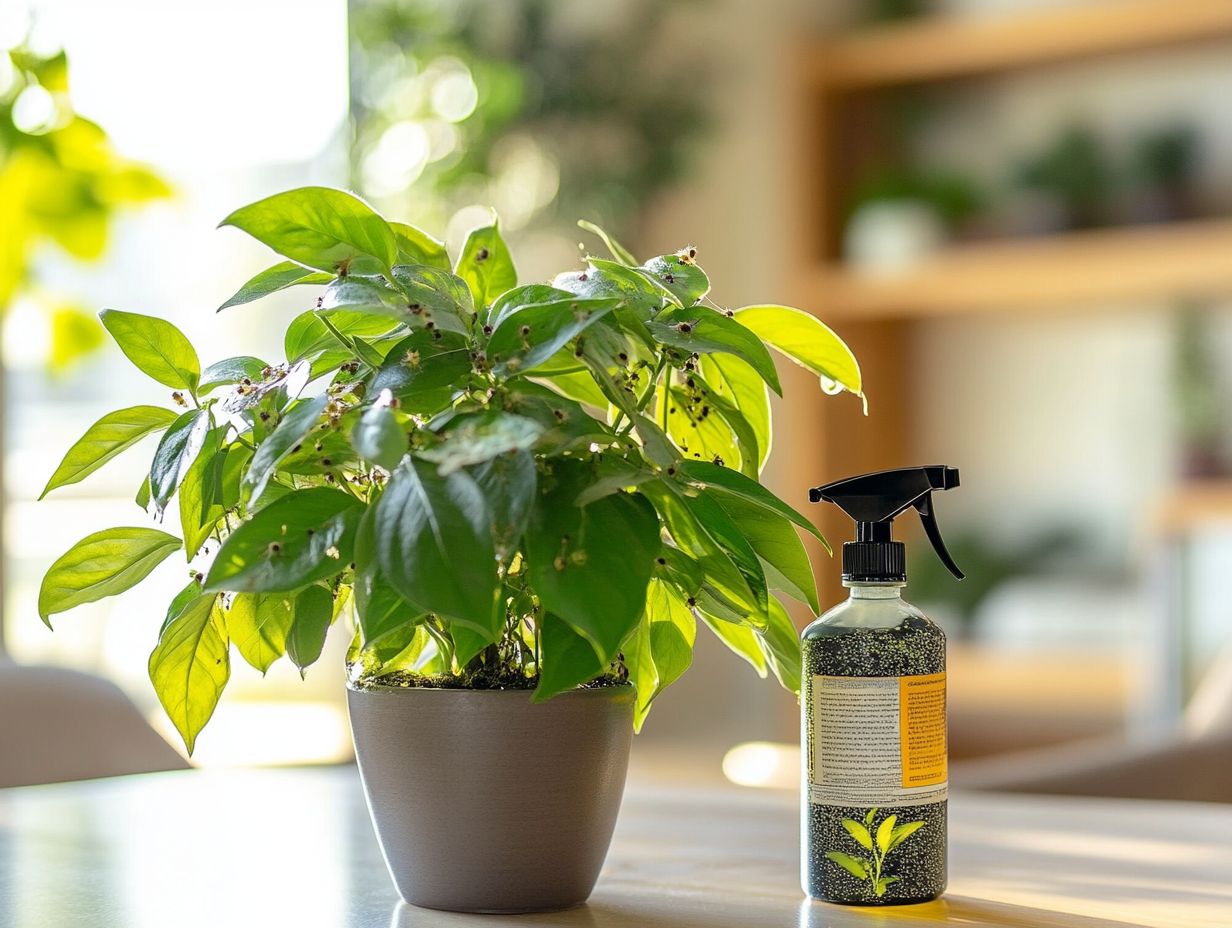
Integrated Pest Management (IPM) for your houseplants combines a range of strategies designed to control pests effectively while minimizing environmental impact and promoting the overall health of your plants, including maintaining proper soil conditions.
This comprehensive approach involves careful checking of pest populations, utilizing natural remedies like neem oil and insecticidal soap, and employing chemical treatments to achieve the best results when necessary.
Learn about pests’ life cycles and their environments to create a tailored IPM plan that ensures your houseplants not only survive but truly thrive amidst potential pest threats.
Cultivating an ecosystem that supports beneficial insects, such as ladybugs, and fosters healthy soil will further elevate your pest management efforts, creating an environment where both your plants and the ecosystem can flourish.
Combining Different Methods for Optimal Results
Combining different pest control methods is essential for achieving optimal results in pest management for your houseplants. This strategy allows you to leverage the strengths of each approach.
By integrating natural remedies, chemical treatments, and preventive measures for pest control, you can craft a robust pest management strategy that effectively addresses various challenges.
Balancing these methods leads to a healthier indoor garden for your plants while minimizing the risks associated with pest infestations. For effective management, knowing how to identify common indoor plant pests is crucial. Tailoring your approach to the specific needs of your plants and their environment is key to successful pest control.
One of the primary advantages of this integrated approach is that it enables you to take targeted action against common pests. This ensures that specific pest problems are managed without harming beneficial insects or the environment. For example, combining neem oil with insecticidal soap can effectively tackle both soft-bodied pests and their eggs, significantly reducing the likelihood of reinfestation.
Implementing preventive measures such as regular monitoring of pest activity and using sticky traps to catch small bugs provides you with real-time insights into pest activity. This information is crucial for making informed decisions about when and how to adjust your tactics, leading to a more resilient indoor ecosystem for houseplants.
Frequently Asked Questions
What are essential pest control techniques for houseplants?
Houseplants are a fantastic addition to your home, but pests can spoil the fun! Here s how to keep them safe and healthy.
Essential pest control techniques for houseplants include:
- Inspecting for pests regularly.
- Using natural or organic pest control methods.
- Properly caring for plants to keep them healthy and less susceptible to pests.
What are some natural pest control methods for houseplants?
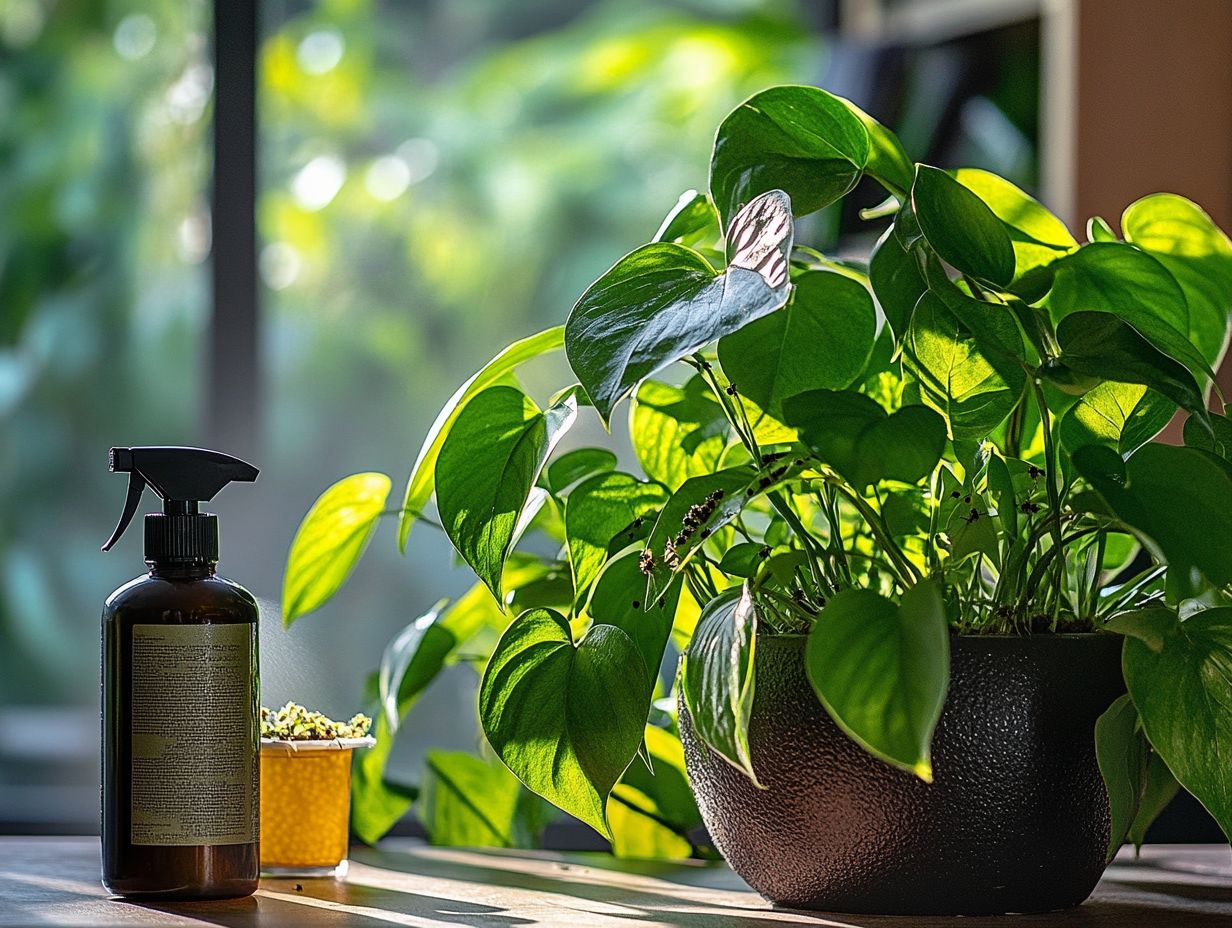
Natural pest control methods for houseplants include using neem oil, insecticidal soap, and a natural powder that can help kill pests called diatomaceous earth. You can also employ helpful insects that can protect your plants, like ladybugs, Cryptolaemus montrouzieri, and Bacillus thuringiensis.
How can I prevent pests from infesting my houseplants?
To prevent pests from infesting your houseplants, regularly clean and dust your plants. Keep them in a well-ventilated area, and avoid overwatering to reduce moisture that attracts pests like fungus gnats and aphids.
Quarantine new plants before introducing them to your existing ones.
What are some signs of pest infestation in houseplants?
- Yellowing or wilting leaves.
- Holes in leaves.
- Sticky residue on leaves or stems.
- Visible pests such as aphids, mealybugs, spider mites, and scale insects.
Are chemical pesticides safe to use on houseplants?
Although chemical pesticides may be effective in controlling pests, they can harm beneficial insects like honeydew-producing whiteflies (Trialeurodes vaporariorum). They can also be harmful to your houseplants and the environment.
It is best to use natural or organic pest control methods to avoid any potential harm.
What should I do if I notice pests on my houseplants?
Act quickly to save your plants! Isolate the affected plant and use natural pest control methods to remove the pests.
You may also need to clean and sanitize the pot and surrounding area to prevent further infestation.

